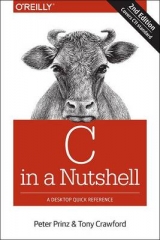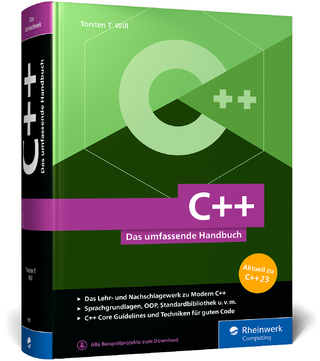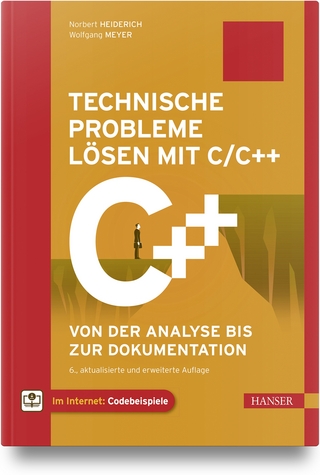
C in a Nutshell
O'Reilly Media (Verlag)
978-0-596-00697-6 (ISBN)
- Titel erscheint in neuer Auflage
- Artikel merken
Learning a language - any language - involves a process wherein you learn to rely less and less on instruction and more increasingly on the aspects of the language you've mastered. Whether you're learning French, Java, or C, at some point you'll set aside the tutorial and attempt to converse on your own. It's not necessary to know every subtle facet of French in order to speak it well, especially if there's a good dictionary available. Likewise, C programmers don't need to memorize every detail of C in order to write good programs. What they need instead is a reliable, comprehensive reference that they can keep nearby. C in a Nutshell is that reference. This long-awaited book is a complete reference to the C programming language and C runtime library. Its purpose is to serve as a convenient, reliable companion in your day-to-day work as a C programmer. "C in a Nutshell" covers virtually everything you need to program in C, describing all the elements of the language and illustrating their use with numerous examples. The book is divided into three distinct parts.
The first part is a fast-paced description, reminiscent of the classic "Kernighan & Ritchie" text on which many C programmers cut their teeth. It focuses specifically on the C language and preprocessor directives, including extensions introduced to the ANSI standard in 1999. These topics and others are covered: Numeric constants; Implicit and explicit type conversions; Expressions and operators; Functions; Fixed-length and variable-length arrays; Pointers; Dynamic memory management; and Input and output. The second part of the book is a comprehensive reference to the C runtime library; it includes an overview of the contents of the standard headers and a description of each standard library function. Part III provides the necessary knowledge of the C programmer's basic tools: the compiler, the make utility, and the debugger. The tools described here are those in the GNU software collection. "C in a Nutshell" is the perfect companion to "K&R", and destined to be the most reached-for reference on your desk.
Peter Prinz directs system software development projects and teaches seminars on programming topics. He has written a number of books on C and C++. Tony Crawford is a freelance translator based just outside Berlin, Germany. In addition to regular software localization projects, he has translated books on network administration and ATM. A US native, he completed undergraduate work at Occidental College, Los Angeles; Universite de Perpignan, France; and Technische Universitat, Berlin. Tony translates from German into English.
Preface I. Language 1. Language Basics Characteristics of C The Structure of C Programs Source Files Comments Character Sets Identifiers How the C Compiler Works 2. Types Typology Integer Types Floating-Point Types Complex Floating-Point Types (C99) Enumerated Types The Type void 3. Literals Integer Constants Floating-Point Constants Character Constants String Literals 4. Type Conversions Conversion of Arithmetic Types Conversion of Nonarithmetic Types 5. Expressions and Operators How Expressions Are Evaluated Operators in Detail Constant Expressions 6. Statements Expression Statements Block Statements Loops Selection Statements Unconditional Jumps 7. Functions Function Definitions Function Declarations How Functions Are Executed Pointers as Arguments and Return Values Inline Functions Recursive Functions Variable Numbers of Arguments 8. Arrays Defining Arrays Accessing Array Elements Initializing Arrays Strings Multidimensional Arrays Arrays as Arguments of Functions 9. Pointers Declaring Pointers Operations with Pointers Pointers and Type Qualifiers Pointers to Arrays and Arrays of Pointers Pointers to Functions 10. Structures, Unions, and Bit-Fields Structures Unions Bit-Fields 11. Declarations General Syntax Type Names typedef Declarations Linkage of Identifiers Storage Duration of Objects Initialization 12. Dynamic Memory Management Allocating Memory Dynamically Characteristics of Allocated Memory Resizing and Releasing Memory An All-Purpose Binary Tree Characteristics Implementation 13. Input and Output Streams Files Opening and Closing Files Reading and Writing Random File Access 14. Preprocessing Directives Inserting the Contents of Header Files Defining and Using Macros Conditional Compiling Defining Line Numbers Generating Error Messages The #pragma Directive The _Pragma Operator Predefined Macros II. Standard Library 15. The Standard Headers Using the Standard Headers Contents of the Standard Headers 16. Functions at a Glance Input and Output Mathematical Functions Character Classification and Conversion String Processing Multibyte Characters Converting Between Numbers and Strings Searching and Sorting Memory Block Handling Dynamic Memory Management Date and Time Process Control Internationalization Nonlocal Jumps Debugging Error Messages 17. Standard Library Functions III. Basic Tools 18. Compiling with GCC The GNU Compiler Collection Obtaining and Installing GCC Compiling C Programs with GCC C Dialects Compiler Warnings Optimization Debugging Profiling Option and Environment Variable Summary 19. Using make to Build C Programs Targets, Prerequisites, and Commands The Makefile Rules Comments Variables Phony Targets Other Target Attributes Macros Functions Directives Running make 20. Debugging C Programs with GDB Installing GDB A Sample Debugging Session Starting GDB Using GDB Commands Index
| Erscheint lt. Verlag | 24.1.2006 |
|---|---|
| Zusatzinfo | Illustrations |
| Verlagsort | Sebastopol |
| Sprache | englisch |
| Maße | 181 x 223 mm |
| Gewicht | 732 g |
| Einbandart | Paperback |
| Themenwelt | Informatik ► Programmiersprachen / -werkzeuge ► C / C++ |
| ISBN-10 | 0-596-00697-7 / 0596006977 |
| ISBN-13 | 978-0-596-00697-6 / 9780596006976 |
| Zustand | Neuware |
| Haben Sie eine Frage zum Produkt? |
aus dem Bereich



